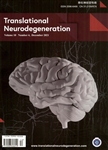Gram-negative bacteria and their lipopolysaccharides in Alzheimer’s disease:pathologic roles and therapeutic implications
作者机构:Department of BiochemistryCollege of MedicineKonyang UniversityDaejeon 35365Republic of Korea Research Institute for Dementia ScienceKonyang UniversityDaejeon 35365Republic of Korea Dandi Bioscience Inc6th Floor of Real Company Building66Achasan-roSungdong-guSeoulRepublic of Korea Harvard Neurology Clinic294 Gwanggyojungang-roSuji-guYongin 16943Republic of Korea Department of ImmunologySchool of MedicineKonkuk University268ChungwondaeroChungju-siChungcheongbuk-doRepublic of Korea
出 版 物:《Translational Neurodegeneration》 (转化神经变性病(英文))
年 卷 期:2021年第10卷第4期
页 面:643-665页
核心收录:
学科分类:1002[医学-临床医学] 1001[医学-基础医学(可授医学、理学学位)] 100203[医学-老年医学] 10[医学]
基 金:funded by the Basic Science Research Program of the National Research Foundation of Korea(NRF) which is funded by the Ministry of Science,ICT&Future Planning(NRF-2018R1D1A3B07041059 to M.M.and NRF-2016R1A5A2012284 to Y.-M.R) by the Cooperative Research Program for Agriculture Science and Technology Development(Project No.PJ01428603) Rural Development Administration,Republic of Korea by the Korea Health Technology R&D Project through the Korea Health Industry Development Institute(KHIDI) funded by the Ministry of Health&Welfare,Republic of Korea(grant number:HF21C0021).
主 题:Alzheimer's disease Gram-negative bacteria Lipopolysaccharide Exotoxin Amyloid beta Tau
摘 要:Alzheimer s disease(AD)is the most serious age-related neurodegenerative disease and causes destructive and irreversible cognitive decline.Failures in the development of therapeutics targeting amyloid-β(Aβ)and tau;principal proteins inducing pathology in AD,suggest a paradigm shift towards the development of new therapeutic targets.The gram-negative bacteria and lipopolysaccharides(LPS)are attractive new targets for AD treatment.Surprisingly,an altered distribution of gram-negative bacteria and their LPS has been reported in AD patients.Moreover,gram-negative bacteria and their LPS have been shown to affect a variety of AD-related pathologies,such as Aβ homeostasis,tau pathology,neuroinflammation,and neurodegeneration.Moreover,therapeutic approaches targeting gram-negative bacteria or gram-negative bacterial molecules have significantly alleviated AD-related pathology and cognitive dysfunction.Despite multiple evidence showing that the gram-negative bacteria and their LPS play a crucial role in AD pathogenesis,the pathogenic mechanisms of gram-negative bacteria and their LPS have not been clarified.Here,we summarize the roles and pathomechanisms of gram-negative bacteria and LPS in AD.Furthermore,we discuss the possibility of using gram-negative bacteria and gram-negative bacterial molecules as novel therapeutic targets and new pathological characteristics for AD.



